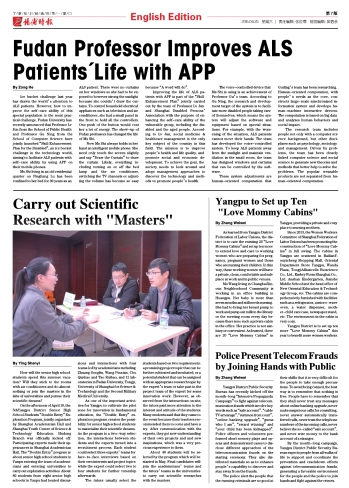Ice bucket challenge last year has drawn the world’s attention to ALS patients. However, how to improve the self-care ability of this special population is the most practical challenge. Fudan University has recently announced that Professor Lv Jun from the School of Public Health and Professor Gu Ning from the School of Computer Science have jointly launched “Skill Enhancement Plan for the Disabled”, an ice bucket challenge in the technology world, aiming to facilitate ALS patients with self-care ability by using APP on their mobile phones.
Ms Shi living in an old residential quarter on Pingliang Lu has been confined to her bed for 30 years as an ALS patient. There were no curtains on her windows so she had to be exposed to however strong the sunlight because she couldn’t draw the curtains. To control household electrical appliances such as television and air conditioner, she had a small panel in the front to hold all the controllers. One push of the button would cost her a lot of energy. The show-up of Fudan professors has changed the life of Ms Shi.
Now Ms Shi always holds in her hand an intelligent mobile phone. She need only touch the screen slightly and say “Draw the Curtain” to draw the curtain. Likely, everything including turning on or off the bed lamp and the air conditioner, switching the TV channels or adjusting the volume has become so easy because “A word will do”.
Improving the life of ALS patients with APP is part of the “Skill Enhancement Plan” jointly carried out by the team of Professor Lv Jun and Shanghai Disabled Persons’ Association with the purpose of enhancing the self-care ability of the vulnerable group, including the disabled and the aged people. According to Lv Jun, social medicine & healthcare management is the only key subject of the country in this field. The mission is to improve people’s health and life quality, and promote social and economic development. To achieve the goal, the society needs to look around and adopt management approaches to discover the technology and methods to promote people’s health.
The voice-controlled device that Ms Shi is using is an achievement of Professor Gu’s team. According to Gu Ning, the research and development target of the system is to facilitate more disabled people taking care of themselves, which means the system will adjust the software and equipment based on special situations. For example, with the worsening of the situation, ALS patients cannot move their hands. The team has developed the voice-controlled system. To keep ALS patients away from the sunlight and maintain ventilation in the small room, the team has designed windows and curtains that can be controlled by the software.
These system adjustments are human-oriented computation that Guding’s team has been researching. Human-oriented computation, with people’s needs as the core, constructs large-scale synchronized information system and develops human-machine interactive devices. The computation is based on big data and analyzes human behaviors and social impact.
The research team includes people not only with a computer science background, but other disciplines such as psychology, sociology and management. Driven by problems, the team has been closely linked computer science and social science to generate new theories and methods that better help to solve the problems. The popular wearable products are not separated from human-oriented computation.
